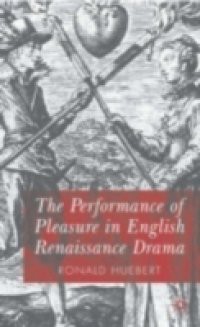This original new study re-situates the interpretation of Renaissance drama by engaging the question of pleasure: both erotic pleasure as represented on the stage, and aesthetic pleasure as experienced by readers and spectators. After a theoretical unfolding of the idea of pleasure, Huebert offers new theatrically informed readings of plays by a broad range of Renaissance dramatists, including Marlowe, Jonson, Marston, Webster, Middleton and Ford. Writing against the grain of current critical orthodoxies, Huebert foregrounds the theatrical author (in the sense that one playwright's take on pleasure differs radically from another's), the interaction of characters (in the sense that pleasures of many kinds are the product of interpersonal negotiations), and agency (insofar as the drama confers particular authority upon pleasures freely chosen). Some of the issues raised here, like the distribution of pleasure by gender and the pivotal notion of consent, are questions that intersect with feminist reinterpretations of Renaissance literature and culture. The study as a whole is an exploration of how and why the drama from Marlowe to Ford both represents and engages in the pursuit and creation of pleasure.

